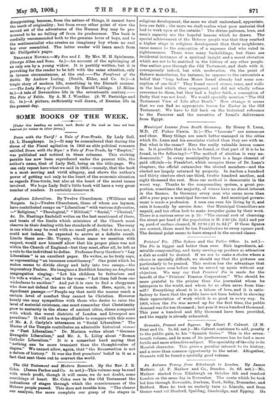The Old Testament and Modern Research. By the Rev. J.
R. Cohn. (James Parker and Co. 4s. net.)—This volume may be read With much profit, though it will cause, we do not doubt, some !earchings of heart. Mr. Cohn sees in the Old Testament the Indications of stages through which the consciousness of the Hebrew people pamd. This does not trouble him. "The clearer cur analysis, the more complete our grasp of the stages in religions development, the more we shall understand, appreciate, love our faith ; the more we shall realise what poor material God had to work upon at the outside." The divine patience, love, and man's capacity are the hopeful lessons which he draws. The special achievement of the Hebrew people was that they reached a higher stage in religions development than their neighbours, came nearer to the conception of a supreme God who ruled in righteousness. There were many backslidings, but there are incidental instances of a spiritual insight and a moral elevation which are not to be matched in the history of any other people. Our author goes through the Old Testament, and deals with it, courageously indeed, but with moderation. On the point of Hebrew monotheism, for instance, he opposes to the extremists a belief that "long before Moses Israel already had some con caption of one God." They found sacred stones, trees, and wells in the land which they conquered, and did not wholly refuse reverence to them, but they had a higher faith, a conception of Deity that was not local. We would specially mention "The Old Testament View of Life after Death." How strange it seems that we can find no appropriate lesson for Easter in the Old Testament. We have to fall back on the historical reference to the Passover and the narrative of Israel's deliverance from Egypt.






































 Previous page
Previous page